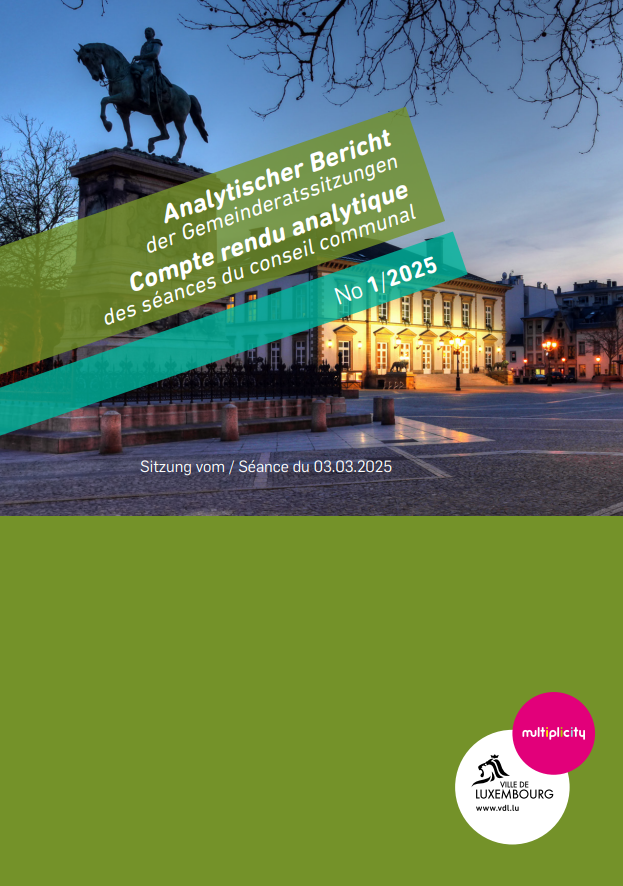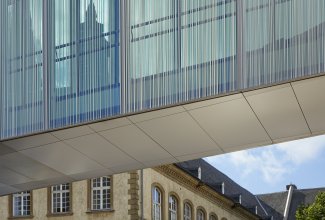Closed session
1. Advisory committees: replacement of members.
2. Rent committee: replacement of members.
3. Municipal Hospices: personnel matters – opinion.
4. Fondation J.P. Pescatore: personnel matters – opinion
5. Office social (Social Welfare Office): personnel matters – opinion.
6. Office social: replacement of a member of the board of directors.
7. Personnel matters – decision.
Open session
8. Questions asked by Municipal Councillors.
9. Traffic: permanent amendments to the traffic regulations – temporary regulations – confirmation of temporary regulations – decision.
10. Agreements – approval.
11. Work estimate – approval: - Rue de Gasperich redevelopment project.
- Rue de Gasperich redevelopment project.
- Rue Michel Weyer redevelopment project.
- Corrected estimate for the renovation and conversion project for the former school at 48, rue Henri VII in Limpertsberg to achieve compliance with the requirements of the City's Service Foyers scolaires (Childcare Department) and Service Enseignement (Education Department).
- Corrected estimate for the project to build an extension to the school building at 3, rue Anne Beffort.
12. Urban planning:
- Minor amendment to the PAG (General Development Plan) (vote) – Extension of the riding centre in Reckenthal.
- Minor amendment to the PAP QE (Special Development Plan for Existing Developments) (vote) – Extension of the riding centre in Reckenthal.
- Minor amendment to the PAG (vote) – "Rue du Fort Dumoulin – [CT-24]" PAP NQ (Special Development Plan for New Developments).
- Minor amendment to the PAP QE (vote) – "Rue du Fort Dumoulin [CT-24]" PAP NQ.
- Listing of the building at 1, rue Laurent Menager as a national cultural heritage asset – opinion.
- Subdivision of land pursuant to Article 29 of the law on municipal planning (loi concernant l'aménagement communal) – decision.
Download
13. Allocation of grants – decision.
14. Motion tabled by Déi Gréng to review the plans for the Rue de Gasperich redevelopment project – vote.
15. Fondation J.P. Pescatore: articles of association of the non-profit organisation. "Résidence Berlaimont" – opinion.
16. Office social:
- application of the Office's internal regulations on flexitime – opinion.
- creation of staff positions – opinion. 17. Legal affairs: authorisations to initiate legal proceedings – decision.
18. Creation/elimination of staff positions – decision.
Live broadcast of meetings
Watch the video recording of this session.
Summary record
The summary record is a transcript of the discussions held and decisions taken by the Municipal Council. As such, it is an important source of information for citizens of the capital with regard to projects and measures that may have an impact on their daily life.
The summary record of this session will be made available shortly.
Keep reading

Keep reading

Questions asked by Municipal Councillors
Follow-up to a serious accident in Limpertsberg
Urgent question posed by Councillor François Benoy
On the afternoon of 14 March, a serious traffic accident occurred in Limpertsberg. Two SUVs travelling at high speeds collided at the intersection of Avenue Victor Hugo and Rue Ermesinde, injuring six people and causing significant damage to property – not just to the vehicles, but also to an electrical enclosure and the wall of a residence. This accident occurred in the centre of Limpertsberg, where there are shops, schools and a brasserie. Once cannot even begin to imagine what could have happened if schoolchildren had been present when the accident occurred. People could have been injured seriously or even fatally.
The Déi Gréng group has long been asking for measures to be put in place to calm traffic, reduce through traffic and limit speed, including by changing the physical design of roads. This would help reduce the probability of serious accidents. Is the College of Aldermen willing to draw conclusions from this accident and put in place the necessary measures in Limpertsberg? At its general meeting, the local interest group asked that steps be taken to calm traffic. A petition on this issue was circulated. It has already been signed by around 200 residents and will soon be submitted to the College of Aldermen.
- Does the College of Aldermen have any new information about this accident? Need I remind you that six people were injured? We hope that everyone involved is now doing well.
- What concrete steps does the College of Aldermen plan to take to improve road safety in Limpertsberg?
- Are there any plans to improve signage and markings? Road users would need to be reminded that they are in a 30 km/h zone. Are there any plans to narrow the road or make other structural changes? Are there ways to regulate traffic to prevent drivers from speeding?
- What measures are planned to prevent through traffic in Limpertsberg?
Response provided by Mayor Lydie Polfer
The City is not involved in the investigation. The police still need to look into the exact circumstances of the accident. It appears that a driver failed to yield the right-of-way, while another was speeding on Avenue Victor Hugo. The occupants of both vehicles were injured so badly that they had to be taken to the hospital by ambulance. An electrical enclosure and a lamppost were overturned. We don't know how the people involved are doing, and privacy rules prevent us from asking about them. The City is also unable to determine the exact speed at which one of the vehicles involved in the accident was travelling on Avenue Victor Hugo, but what is certain is that it was not travelling within the 30 km/h speed limit. So two basic rules of the Traffic Code (Code de la route) were violated. The right-of-way sign is displayed at all intersections. Parents need to remind their children that it is important to observe the basic rules of the Traffic Code and, of course, every adult must also do so. Alderman Goldschmidt will tell you more about the City's general position on through traffic, and what it is planning to do in the coming months.
Response provided by Alderman Patrick Goldschmidt
The intersection of Avenue Victor Hugo and Rue Ermesinde has never been an accident black spot. As Mayor Polfer already said, we need to wait for the outcome of the investigation to find out exactly what happened. The City is not involved in the investigation. When accidents like these occur, it is generally because one, or more likely two road users – as was the case here – failed to observe the rules.
Both Avenue Victor Hugo and Rue Ermesinde are 30 km/h zones. Moreover, Avenue Victor Hugo is already so narrow that drivers automatically slow down on it. Many buses – municipal buses as well as school buses – travel along Avenue Victor Hugo. Everything is regulated and signposted on both Avenue Victor Hugo and Rue Ermesinde, in accordance with the Traffic Code.
The accident could have had even more dire consequences because pedestrians on the pavement could have been injured.
As for the measures that the City is planning to introduce, I want to underscore that one of the main items of the municipal mobility plan addresses traffic calming in the districts, and particularly curbing through traffic. Various municipal departments are currently working on this. In the coming months, we will be visiting different districts to recommend a number of measures, which will then be implemented as part of a one-year-long test phase. We need to be aware of the fact that the traffic-easing measures that entail reversing the direction of traffic on some streets will require residents to make a detour of several hundred metres. Once the analyses are completed, the measures will be recommended to the College of Aldermen, examined in committee and presented to the residents of the relevant districts in the second half of 2025.
François Benoy: It seems obvious to me that road users must observe the rules. The fact of the matter is that if measures are implemented, it is likely that fewer accidents will occur. To ask some concrete questions: Is Limpertsberg one of the districts for which the City intends to make recommendations in the coming months? And does the City plan to take steps for Limpertsberg right away? We have been voicing our requests for this district for quite some time.
Alderman Patrick Goldschmidt: Councillor Benoy knows full well how this works. Measures are not put in place overnight. In the coming weeks, the College of Aldermen will discuss the planned measures in detail. These measures will then be presented to the relevant advisory committee and the residents of the districts concerned. We will then implement the measures. As I already said, we do not have more specific information about the accident in question. Perhaps district residents were involved in the accident. If just one in a thousand motorists thinks they need to drive fast, not a single measure aimed at preventing through traffic will be able to change anything. In any case, we will take concrete steps, and Limpertsberg is one of our priorities.
Mayor Lydie Polfer: It always surprises me that the basic questions that should be asked here aren't, and that the crucial observations that should be made aren't either. The two road users failed to observe the basic rules, that is to say, yield the right-of-way and observe the speed limit. If anyone had been fatally injured, we would be talking about involuntary manslaughter. I hope the investigation is completed quickly and that it is determined who is liable. I also hope that it won't take three years to do so. In any case, we will implement our measures more quickly. As for traffic easing, Councillor Benoy is well aware that there are still many schools in Limpertsberg, and that they are served by many buses. This will be impossible to change in the coming years. However, we will do everything to ensure that road users are as safe as possible. Nevertheless, all provisions in force must be observed. We cannot simply act as if fault lies with other people. Road users must take responsibility for their own actions.
Installation of shelters for municipal workers
Question posed by Councillor Antónia Afonso Bagine
The municipal workers who help children and parents near schools and bus stops must deal with the vagaries of the weather. This is especially the case in the winter, but they also face extreme heat in the summer, and suffer from challenging working conditions on those days. Does the College of Aldermen plan to install shelters for municipal workers?
Response provided by Mayor Lydie Polfer
Municipal workers are required to be outdoors in all weather conditions, as is the case for other City workers, such Service Hygiène (Sanitation Department) staff. They are provided with appropriate clothing: warmer clothing in the winter and lighter clothing in the summer. Also, in practically all city districts, there are places where municipal workers can spend their 30-minute breaks or take shelter during bad weather. These spots are located in municipal buildings in Beggen, Belair, Bonnevoie, Cessange, Eich, the Glacis, Hollerich, Merl and Ville-Haute.
Introduction of a vacancy tax
Question posed by Councillor Linda Gaasch
The vacancy rate for commercial properties in Luxembourg City is not insignificant: it is 7.5% in Ville-Haute, 10.6% in the Gare district and up to 25% on Avenue de la Gare, according to data provided by the Luxembourg City Business Association (Union Commerciale de la Ville de Luxembourg) from November 2023.
The city of Esch-sur-Alzette is facing a similar problem. To encourage property owners to put vacant properties on the market, the City of Esch-sur-Alzette's College of Aldermen (CSV/DP/Déi Gréng) is planning to introduce a vacancy tax. This tax is expected to amount to 20% of the average rent in the first year, and 50% in subsequent years.
What is the position of the City of Luxembourg's College of Aldermen on introducing such a tax on vacant properties? Is there a study currently being conducted on introducing such a tax? Are there plans to introduce such a tax? If not, why not? If so, within what time frame?
What other concrete steps have been taken, or are planned, to tackle the issue of vacant residential properties? What are the specific objectives? What is the timeline?
I'm happy that this question is finally on the agenda, because I first asked it about a year ago.
Response provided by Alderman Laurent Mosar
Councillor Gaasch, please accept our apologies for taking so long to address this question. We had to seek the opinion of several different parties, and there was also a court ruling that we had to be consider before providing an answer to this question.
The vacancy tax is indeed an appealing idea, which has been around for quite some time. In the last 12 years, Municipal Councillors have asked eight questions on this topic. In a previous iteration of the College of Aldermen, one of the members (Déi Gréng) provided Councillor Gaasch with more or less the same answer that I will be giving her today. The issues have not changed. As far as we are aware, the vacancy tax has been introduced only in Esch-sur-Alzette. And what's more, it exists only on paper, that is to say, it has yet to be collected. This is due to practical issues that mainly have to do with data protection. It is not easy to obtain the required information about the owners of commercial spaces. On top of that, questions about monitoring and penalties arise.
There is also a new factor to consider: a court ruling on the property taxes collected by the municipality of Diekirch highlighted the key principles underlying the introduction of a new municipal tax. The specific issue is proportionality, but a very important point was also reiterated, that is, confirmation of the case law and of the doctrine that, as a general rule, taxation must be in the public interest and must respect the public's fundamental rights as regards the freedom of trade and industry. Furthermore, under the "Kommunalabgabengesetz", the municipality must also prove the existence of a financial need. So, when a new tax is introduced, it must be demonstrated that there is a genuine financial need. Our colleagues in Esch-sur-Alzette probably do have such a need but, fortunately, Luxembourg City does not. That is the main reason why we cannot yet go down this path. A clear legal basis must first be established. The Ministry of Home Affairs (Ministère des Affaires intérieures) is in the process of drafting a bill to that effect.
Nonetheless, the City has taken a series of other steps to tackle the issue of vacant commercial properties which, by the way, are no more prevalent in the capital than in other municipalities. The pop-up store programme is well known. As part of another initiative, when commercial property owned by the municipality is rented out, the rental price offered by the potential tenant is not the decisive factor. This reflects the City's desire to give everyone a chance to rent commercial property in the capital at an affordable price. The City also rents vacant commercial properties to sublet them. So a lot has already been done. In my opinion, these measures are the best way to reduce the number of vacant properties, because taxes cannot solve the problem on their own.
Support for public elementary schools and social diversity
Question posed by Councillor Christa Brömmel
Around half of the children living in Luxembourg City attend an elementary school other than one of the 19 municipal elementary schools. In the February and March 2025 issues of CityMag, two private schools – the École Sainte-Sophie and the Waldorf school – took out full-page ads publicising their academic offerings and inviting people to an open day.
- Did the College of Aldermen authorise these ads? Does it believe that the content is appropriate? What are the guidelines for advertising in CityMag?
- How does the City of Luxembourg promote public schools in the city?
- While we do need to provide our diverse population with a range of educational options, does the College of Aldermen share the view that public schools in Luxembourg City need to promote themselves more aggressively among parents of school-age children?
- Does the City have comparative data on the social diversity in district schools?
- How, through what channels and when are public elementary schools promoted among parents living in Luxembourg City with a view to improving social diversity in public elementary schools?
- To that end, are there plans to hold open days as a matter of course? If not, why not?
Response provided by Alderman Paul Galles
Under the terms of the agreement with the media company, Maison Moderne, advertising in CityMag is managed by Maison Moderne. There are two criteria that must be met: local business must not be put at a disadvantage, and neutrality is required – that is, no political advertising is accepted, for example. When in doubt, Maison Modern consults our Service Communication et relations publiques (Communications and Public Relations Department). In this case, the existing guidelines were applied correctly. The College of Aldermen will be addressing this issue to decide whether it is advisable to place more ads for private schools in CityMag in the future.
It is indeed important to promote public schools and show how good they are. CityMag does not publish ads for public schools per se, but it does publish commentaries, in-depth reports and testimonials by people who work in education. For example, the June 2025 issue has an article on "Donne-moi la main" (Give Me Your Hand), a collaboration between Rotondes and the City's Service Enseignement (Education Department). The March 2025 issue looked at the extensive "Megare" project, which was carried out in the Gare district in collaboration with UpFoundation. The October 2024 issue was devoted to the Walking Bus programme and the people who escort the children to school. The September 2024 issue reported on a series of educational and cultural projects run by the City's Service Enseignement, including the TechoLink Makerspace. The February 2024 issue featured reports on the hedge-planting initiative involving pupils from Luxembourg City's elementary schools, and on the "Laf vum Bam" race. All of this is to say that CityMag often showcases public elementary schools. There is also a brochure with the addresses, names of contact persons, and other practical information about the schools.
As for the request for a more proactive approach, I think we need to place the emphasis on the high quality of our schools. Currently, the offerings are not described as a whole online because we want to avoid educational tourism. Some schools have taken the initiative to produce a joint website, while others publicise themselves through the Plan d'Encadrement Périscolaire (Extracurricular Support Plan – PEP). These are worthwhile initiatives that are also effectively implemented. We will be revisiting the possibility of creating a comprehensive, more structured website, and thinking more about how to publicise the schools even more effectively. However, this would not involve engaging in targeted advertising for a specific school, because we would not want to give the impression that certain schools are more desirable than others.
What is important is finding the right balance. This also applies to the percentage of children who live in the capital and attend public elementary schools. Of course, we may think that it is a good idea to increase this percentage, but we also need to bear in mind that, at this juncture, the existing infrastructure cannot accommodate a significant increase in the number of pupils. When new residential districts are created, the need for more elementary schools is always taken into account. We also take into account the fact that some parents don't enrol their children in the city's public elementary schools. The reasons they have for not doing so may be entirely valid and understandable. Promoting literacy in French may increase the number of children attending public elementary schools, but we do not think this will lead to a surge in numbers, since many families want their children to receive a French-only or English-only education for their entire educational careers.
The City does not collect data on social diversity directly. However, it does have access to information through to the social index, which we receive regularly in accordance with an agreement with LISER (Luxembourg Institute of Socio-Economic Research). In addition, the Observatoire social (Social Observatory) provides us with an overview of what is happening in the districts in general, and standardised tests give us a more precise overview of the different schools.
The City contacts parents whose children are of the age to attend Cycles 1.0 ("early education") and 1.1 of elementary school. At the Bierger-Center, new residents are also provided with information about the city's public elementary schools.
It is up to each school, or the management of the school, to organise its own open days. The City encourages schools to hold open days. However, it is important to note that, unlike secondary schools, which students can choose themselves, elementary schools cannot be chosen since attendance depends on where pupils live.
Making use of vacant housing units
Question posed by Councillor François Benoy
At the exhibition entitled "Who's next ? – Sans-abrisme, architecture et les villes" ("Who's next? – Homelessness, architecture and cities"), which was put on by Inter-Actions in Neimënster from 26 November 2024 to 2 February 2025, there was a sign saying that the housing vacancy rate in Luxembourg City was 7.7% in 2021. In response to a question I asked, the organiser sent me an article from L'Essentiel, which referred to 2010 data from STATEC and LISER. The figure of 7.7% does not appear in the Housing Local Action Programme (Programme d'action local logement – PAL), or in any other City of Luxembourg document. The head of the Social Housing Agency (Agence Immobilière Sociale – AIS) previously said that 20% of housing units were vacant nationwide, and he recently said there were between 10,000 and 20,000 vacant housing units.
It is important to know how many vacant housing units there are so we can develop political tools to tackle this phenomenon. This leads to the following questions that I would like to put to the College of Aldermen:
- Can the College of Aldermen confirm that the housing vacancy rate in Luxembourg City is 7.7%? If not, what does the College of Aldermen estimate it to be?
- Is the College of Aldermen aware of the STATEC and LISER studies cited by L'Essentiel? If so, why weren't these figures published in City of Luxembourg documents, particularly the PAL?
- Given the reference to 2010, is it possible that the article was referring to the study on vacant housing and the rent register that the City commissioned CEPS/INSTEAD to do?
- Due to a legal ruling that found a technical flaw, this study was never published. However, this information could still be very useful. Does the College of Aldermen agree that such a study should be revived?
- Unlike other municipalities – namely, Esch-sur-Alzette, Diekirch and Redange-sur-Attert – the City of Luxembourg has no municipal tax on vacant housing. Does the College of Aldermen agree that such a measure would be an effective way of tackling the issue of vacant housing units?
- Another effective way of making use of vacant housing units is to promote rented social housing. What are the concrete results of the current agreement between the City of Luxembourg and the Social Housing Agency, under which the City covers only the personnel costs of four employees? Does the College of Aldermen agree that this cooperation should be deepened?
- What other options is the College of Aldermen considering to make use of vacant housing in Luxembourg City?
Response provided by Alderman Laurent Mosar
We are not aware of the studies that Councillor Benoy is referring to, so we cannot confirm or deny the statistics. However, those figures would be surprising, because one problem is that it is very hard to count all of the housing units, given that there is not yet a commonhold division table (cadastre vertical) for Luxembourg City.
As for the question of introducing a tax on vacant housing, the principle is the same as for the tax on vacant commercial properties (see question 3). However, for vacant housing there is draft legislation (filed on 10 October 2022) that aims to create a legal basis. The bill in question is Bill 8082 on land tax, tax on the mobilisation of land and tax on the non-occupation of housing. The current government has set up working groups to analyse how the bill may be implemented. Right now, the plan is to separate the issue of the property tax and the introduction of new taxes, because of a number of problems, such as with regard to the commonhold division table.
Because there is no legal basis, introducing a tax on vacant housing is not something that is going to happen now or in the near future. As with the tax on vacant commercial properties, we do not think that taxes can solve the problem. What we need is a proactive policy to build housing, like the one the City is implementing. Much has been done in recent months, and there is still a lot to be done in the coming months. As an example, I can mention the purchase of off-plan housing projects (VEFA), though which the City is expanding the housing offerings. The College of Aldermen plans to continue this policy. If the legal basis changes, the City will take relevant action.
Letter sent to the Municipal Council by the association <em>Planning Familial</em>
Urgent question posed by Councillor Tom Weidig
I was surprised to learn that the Municipal Councillors received a letter by email from the family planning association, Planning Familial, shortly before the vote on the grants to be allocated to the association Vie Naissante. In that letter, the president of Planning Familial, Ainhoa Achutegui, and the association's secretary, Fatima Rougi, fiercely criticised Vie Naissante. They accuse it of making statements that are contrary to scientific consensus, and of violating women's rights. Yet, many women are members of Vie Naissante. One of those women is here today at this very Municipal Council meeting.
I would therefore like to put the following questions to the College of Aldermen:
- Does every organisation and resident of Luxembourg City have the right to send a letter to all Municipal Councillors before every Municipal Council vote?
- If not, why was an exception made in this case?
- Did the College of Aldermen ask Vie Naissante if it also wanted to send a letter to the Municipal Council to defend itself against the serious accusations, which it deems unfair and false?
Response provided by Mayor Lydie Polfer
We did not make any exceptions. The letter was addressed to the Mayor and all Municipal Councillors. Our typical procedure is to forward letters to the respective recipients. This specific case related to a topic that was on the agenda today, so it was even more obvious that the letter should be forwarded. If other people had also spoken out on this topic, we would, of course, have also forwarded their statements. So everything was done by the book. It is important to us that everyone is treated equally. Its also sometimes happens that Municipal Councillors find invitations on their seats in the meeting room. For the sake of transparency and courtesy, we pass on these messages to their intended recipients.
Councillor Tom Weidig: You did not answer my third question. The City did not give Vie Naissante the opportunity to articulate a position on the accusations. That is not fair play.
Mayor Lydie Polfer: We don't ask if someone wants to write to us. If someone wants to write us a letter, they do, and if they don't want to, they don't.
Article 13, paragraph 3 of the Municipal Law establishes that each member of the Municipal Council, acting in their individual capacity, shall enjoy the right of initiative to add to the agenda drawn up by the College of Aldermen one or more proposals that they wish to submit to the Municipal Council.
Such proposals must be submitted to the Mayor in the form of a written reasoned request at least three days before the meeting of the Municipal Council.









